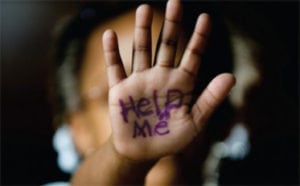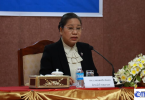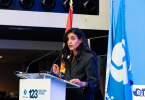Global representatives of governments, tourism businesses, law enforcement agencies, the UN and civil society are gathering in Bogotá today to agree on a long-term agenda and action to end the sexual abuse and exploitation of children in the travel industry.
The International Summit on Child Protection in Travel and Tourism, hosted by the Government of Colombia in partnership with the High-Level Task Force on Child Protection in Travel and Tourism; UNICEF; UNODC; WTTC and ECPAT International will bring together more than 400 participants from 25 countries to commit to reinforced action. This will include pledging to raise awareness about the sexual exploitation of children; tackling child trafficking; adhering to codes of conduct; regulating ‘voluntourism’ in institutions where children are present; and increasing the training of staff to recognize when children are in danger of being trafficked or sexually exploited.
“This Summit is an example of the Colombian Government’s commitment to responsible tourism” said Sandra Howard Taylor, Vice Minister of Tourism from the Colombian Government, and host of the event. “We strive to prevent exploitation of children in tourism. The principal result of this Summit will be the signing of a declaration from private and public sector, to enforce policy and actions to protect children. Colombia is a country known for many good practices in tourism and has already taken many actions, including for protecting children. Almost all tourism companies in Colombia, approximately 25,000, have joined Government tourism programmes to prevent and respond to the exploitation of children.”
Delegates are expected to agree to a plan, aligned with the 2030 Agenda for Sustainable Development to implement the recommendations of the Global Study on the Sexual Exploitation of Children in Travel and Tourism. Many of those at the summit are urging governments, the private sector, law enforcement agencies, UN agencies and civil society organisations to better protect children from trafficking and travelling child sex offenders. This includes, in particular, more coordination between governments and the industry.
Speaking on behalf of the World Travel & Tourism Council (WTTC), the global authority on the economic and social contribution of travel and tourism, Helen Marano, Executive Vice President, commented, “Today’s Summit is an important step towards recognising the many companies that are standard bearers in the sector for this critical issue. They serve as an inspiration for all businesses to take on child protection needs in training and everyday operations. The commitments that are to be articulated in the declaration will spur stronger partnerships. WTTC stands behind a robust commitment with the Council’s Members to support meeting the critical need for child protection in all forms across the Travel and Tourism industry. We are proud of the collaborative efforts of the Summit’s participants and encourage industry members to follow suit.”
The travel and tourism sector has grown substantially in recent years. It contributes 10.4 per cent to global GDP and 1 in 10 jobs, with a forecasted 4 per cent average annual growth over the next ten years. The UN World Tourism Organization projects 1.8 billion travellers by 2030. This growth provides wider and easier access for all travellers and underscores the need for the stronger measures for child protection.
Many countries lack sufficient legislation to stop or deter travelling child sex offenders, who often take advantage of poverty, social exclusion, and weak laws that offer a culture of impunity. In recent years, increasing innovation in the travel and tourism industry has added to the risks. In addition, the Internet facilitates access to travel options, but can also enables the dangers of travelling child sex offenders to exploit children.
- For survivors of sexual exploitation, the legacy includes severe and life-long physical, emotional and psychological damage. This is a crime that shatters communities, destroys families and cultural dignity, and undermines the future economic prospects of entire populations.
- The situation is dynamic. A few decades ago, the prevailing assumption was that travelling child sex offenders came almost exclusively from western countries and went to poor, developing countries. Today, we know that the lines between destination, transit and source countries are blurred and the profile of offenders is diverse.
- Because this is a cross-border and cross sectoral issue, ending the sexual exploitation of children in travel and tourism requires global cooperation and cross-sectoral partnerships. There is a need to move from fragmented child protection responses in individual countries towards a comprehensive approach. The International Summit on Child Protection in Travel and Tourism in Bogotá, Colombia is an effort to bring together more than 50 world leaders from governments, private sector, law enforcement agencies and civil society organizations to achieve this.
- The meeting is a follow-up to the Global Study on the Sexual Exploitation of Children in Travel and Tourism, the first ever consolidated effort by 67 partners to understand the global nature and scope of this crime. The study sets out recommendations that require concerted action from the UN, governments, NGOs, police, and tourist focused businesses. The meeting will reach consensus on how to further implement these recommendations.
- The Sustainable Development Goals and Agenda 2030 include targets specific to sustainable tourism and ending violence against children. The Summit will develop a roadmap that all stakeholders agree to commit to in order to implement Agenda 2030.
About WTTC: The World Travel & Tourism Council is the global authority on the economic and social contribution of Travel & Tourism. It promotes sustainable growth for the sector, working with governments and international institutions to create jobs, to drive exports and to generate prosperity. Every year WTTC, together with Oxford Economics, produces its flagship Economic Impact Report, which looks at the socioeconomic benefits of Travel & Tourism on global, regional and country level. This year the report shows data on 25 regional groupings and 185 countries. The sector contributes US$8.3 trillion or 10.4 per cent of global GDP, once all direct, indirect and induced impacts are taken into account. The sector also accounts for 313 million jobs or one in ten of all jobs on the planet.
About UNICEF: UNICEF works in some of the world’s toughest places, to reach the world’s most disadvantaged children. Across 190 countries and territories, we work for every child, everywhere, to build a better world for everyone. Follow UNICEF on Twitter and Facebook
About UNODC: The United Nations Office on Drugs and Crime is a global leader in the fight against illicit drugs and international crime. It operates in all regions of the world through an extensive network of field offices. Its work includes assisting states to ratify and implement relevant international treaties and to develop domestic legislation on drugs, terrorism and crimes, such as human trafficking. Since 2015, UNODC has led a programme called “Global Action to Prevent and Address Trafficking in Persons and the Smuggling of Migrants,” funded by the European Union and implemented in partnership with the International Organization for Migration and UNICEF, which reaches 13 countries across Africa, Asia, Eastern Europe and Latin America. This work falls under the 2030 Sustainable Development Agenda, which calls for an end to trafficking and violence against children.
About the High-Level Task Force on Child Protection in Travel and Tourism: The high-level task force guided the development of the Global Study on the Sexual Exploitation of Children in Travel and Tourism. Its mandate is the elimination of the sexual exploitation of children through the implementation of the recommendations of the global study.
About ECPAT: ECPAT International is a global network of organizations dedicated to ending the sexual exploitation of children. With more than 100 members in 93 countries, ECPAT focuses on stopping the trafficking of children for sexual purposes; child and early forced marriage; online child sexual exploitation; and the sexual exploitation of children in the travel and tourism sector. The ECPAT International Secretariat is based in Bangkok Thailand. For more information, go to www.ecpat.org
Related
yahoo






